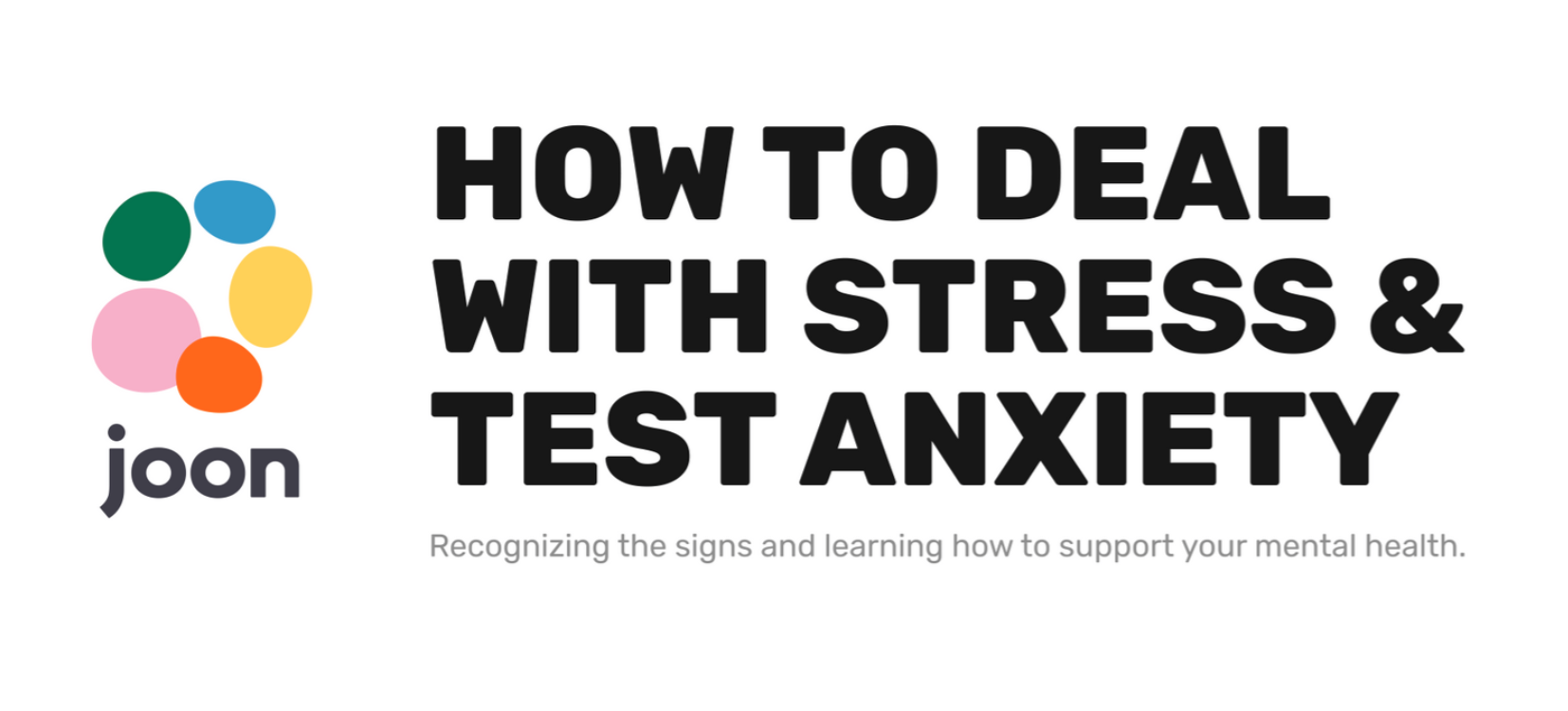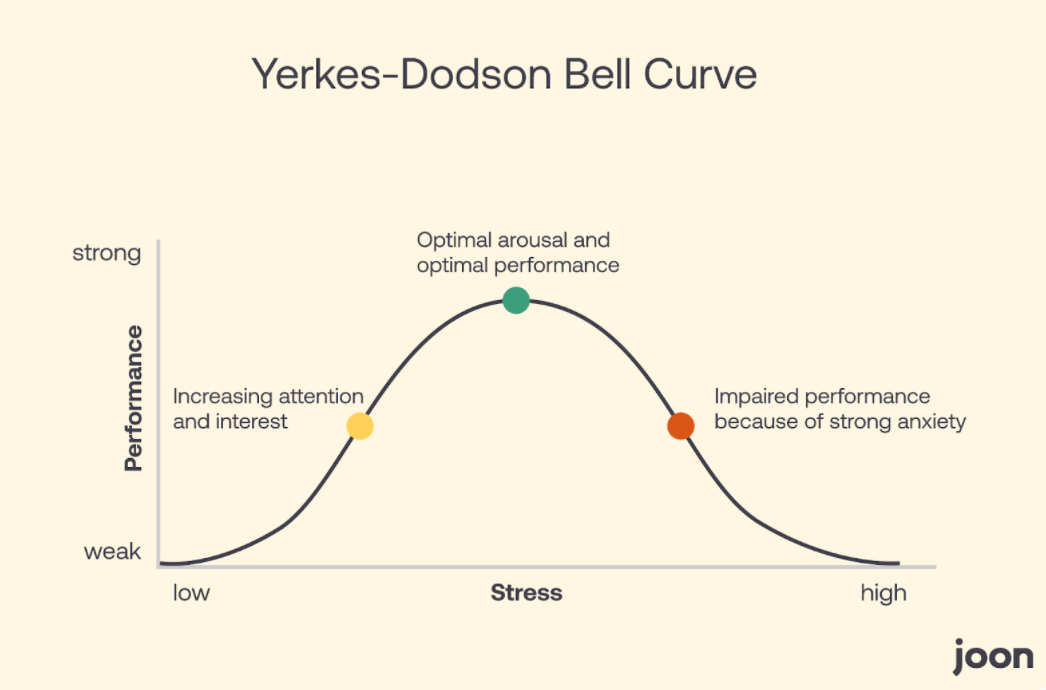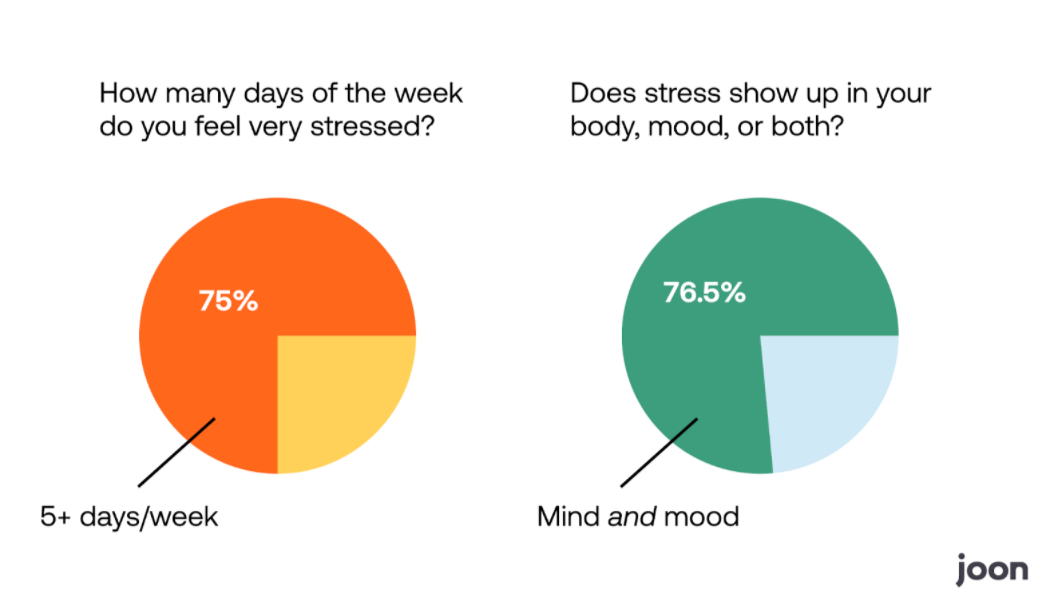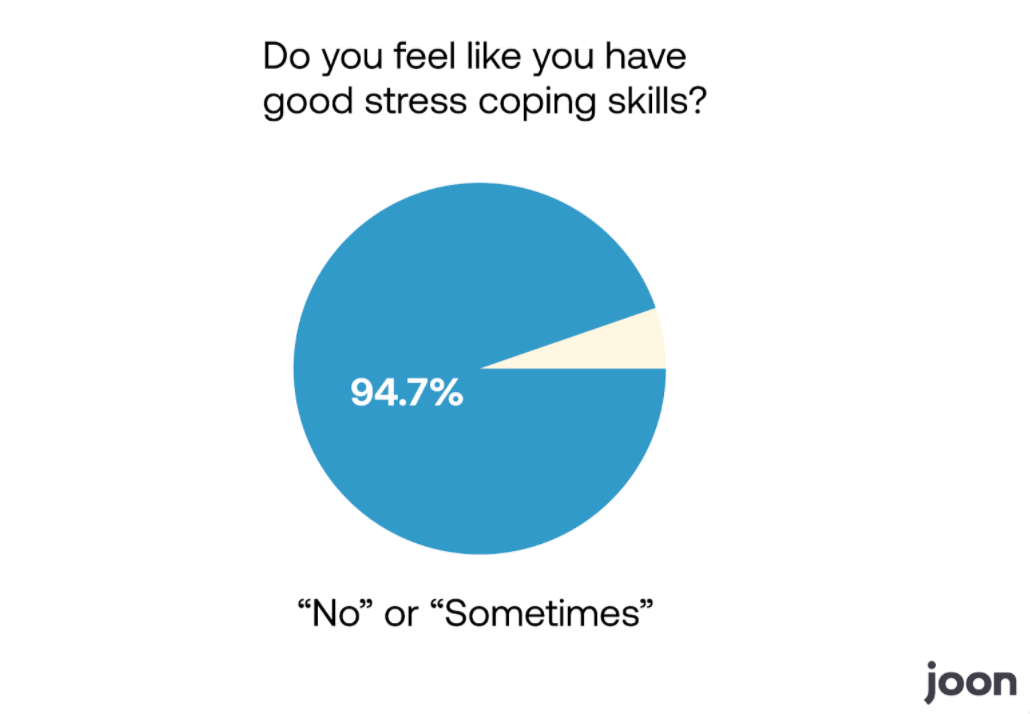The Overwhelming Stress of Test Anxiety: Recognizing the signs and learning how to support your mental health
8 min read•july 11, 2024
fiveablejoon
Health and Wellness 😀
18 resourcesSee Units

Hi Fiveable Community! Our team at Joon is excited to be here as a resource and help shine some light on the mental health challenges that we all face. We are grateful for everyone who participated in our first survey on stress.
We found that a majority of students are currently dealing with high levels of stress. Most students experience stress five or more days a week, even if they don’t show it or talk about it. If you’re stressed - you’re not alone!
As we sorted through your responses to the survey, we found the following clear themes:
There is never enough time to study;
I’ll never be sufficiently prepared;
The pressure of doing well is overwhelming;
The fear of failure is paralyzing.
In the clinical world, this stress is actually known as test anxiety. Test anxiety is a form of school-related performance anxiety that can lead to feelings of inadequacy, procrastination, distraction, and unhealthy and harmful behavior. To understand all the facets of school-related stress and collectively answer your questions, let’s do a deep dive into understanding test anxiety.
That Time of Year
The sun is shining, the days are longer, the flowers are blooming. Our moods and thoughts start pointing straight toward summer.
But for many students, the mood right now is anything but optimistic. For this is also one of the harshest, most stressful, most overwhelming of seasons - exam season.
As a clinical psychologist who works with teens and young adults as well as a mom to a college freshman and high school junior, I’ve seen firsthand how stressful the test anxiety of exam season can be. In this blog, we’re going to talk about all the ways that test anxiety can affect you as well as identify some practical tips for managing test anxiety and getting to the other side of exam season with your mental and physical health intact.
The irony of test anxiety is that while the intention is to do well on exams, the reality is that the more we stress about exams the less well we are likely to do. You may have heard of the Yerkes-Dodson law of performance. This very famous and well-tested theory suggests that the relationship between arousal/stress and performance is an inverted U-shape.

At very low levels of stress, we tend to perform poorly. As we get a little bit more aroused (“stressed”) we actually do better. In moderate amounts, stress has positive effects – we are more alert, more engaged, more focused – that can translate to better exam performance. But the positive effects of stress only last to a certain point. When we get too stressed, performance tends to go down again. The goal of this blog post is to help you figure out how to stay away from too much exam stress and get back to the area where a little can go a long way.
Signs of Test Anxiety
According to our recent survey of Fiveable students, more than 75% reported feeling stressed at least 5 days per week. More than 76% reported that they experience stress in their body, as well as in their mind and mood.

These survey findings are consistent with what the research shows about stress. Test anxiety is often experienced with physical symptoms of stress, along with negative thoughts and anxious or depressed mood.
Physical symptoms
When we are stressed, especially the kind of prolonged and preoccupied stress that can precede exam periods, our bodies tend to manifest that stress in some way. Common physical symptoms of stress include:
- Difficulty sleeping/feeling fatigued
- Poor appetite
- Upset stomach
- Headaches
- Neck and back pain
- Eye strain (even worse this year with so much online learning)
Negative thoughts
The very brains that allow us to learn material, manipulate ideas, and solve problems can also be our worst enemies. One of the most challenging parts of test anxiety can be the constant “what if” and catastrophic thoughts that plague us in the weeks leading up to the exams. Common negative, self-critical, and catastrophic thoughts include:
- “I’ll fail”
- “If I don’t get high marks, I won’t…(get into college; get a job; keep my scholarship)”
- “My parents will be angry or disappointed”
- “I can’t do it, I’m not prepared, I’ll choke”
Anxious or depressed mood
With all the pressure of exams (real and perceived), it is not surprising that as the stress starts to get to us that we start to feel anxious and/or down. Often we feel anxious first – stressed, overwhelmed, worried, on edge. But feeling that anxious for too long is exhausting on the body and mind, and it isn’t uncommon for a depressed mood to start taking over. Depression can look more like fatigue, not caring, and not finding any motivation. It makes sense – it is hard to maintain the emotional energy of being that stressed for that long, and that “giving up” feeling is a bit of a break.
Common signs of anxiety include:
- Feeling nervous
- Having panic attacks
- Difficulty sleeping
- Difficulty concentrating
- Racing worry thoughts
Common signs of depressed mood include:
- Low motivation/unable to get things done
- Feeling tired, sad, or just empty
- Difficulty sleeping
- Difficulty concentrating
- Negative, self-critical, catastrophic thoughts
So How Do I Cope?
It turns out, most students are wondering the same thing.

Nearly 95% of students responded that they either do not have good stress coping skills or only sometimes have good stress coping skills. First we need to identify which forms of coping are healthy and which are unhealthy, then we can focus on changing our behaviors to align with healthy coping skills.
Unhealthy coping strategies
When we feel this much stress, it is natural to want to feel better. But many of us lack healthy coping strategies and end up turning to unhealthy coping strategies such as:
- Overeating or undereating
- Oversleeping or not being able to sleep
- Skipping class or other commitments
- Getting irritable with family or friends
- Cutting or other forms of self-injury
While all of these coping strategies may make us feel a little better in the short term, they usually end up causing us more problems or stress in the long run.
So What Can I Do?
I imagine that by now you’re thinking to yourself “YES! This is me! This is how I feel. But… so what? I still have to get through the next few weeks. I still have to take these exams. Knowing I’m stressed doesn’t make it any easier to deal with it.”
We can’t make exam season just magically disappear. And we can’t pretend that exams don’t matter at all. So I’m not here to tell you that we can make all the test anxiety go away. BUT we can find healthier ways to cope with the stress and anxiety of exam season:
1. Take care of your body.
As noted above, there are real physical effects of stress. And when our bodies are stressed, it can affect our mind and mood. So focusing on the basics of physical self-care is actually the best thing you can do to get into the adaptive range of stress. Physical self-care includes:
- Getting enough sleep
- Eating healthy food that provides the nutrients your body needs
- Stretch and give your body breaks from hunching over a computer
- Meditation, mindfulness, or other relaxation exercises to calm your body. Guided meditations are available on our website here: joon.com/meditations
2. Take care of your mind.
If you find yourself generating the kinds of negative, self-critical, or catastrophic thoughts above, challenge yourself to think differently. The data is very clear that the outcomes we worry about – college admissions, job attainment, life satisfaction – are not significantly impacted by grades, GPA, or exam scores. We are holistic human beings and have many personal and contextual characteristics that will predict our success in life.
3. Make customized personal affirmations.
To help your brain focus on that holistic view of life and stay away from over-emphasizing exam performance, make yourself a list of 5 positive self-statements. Write these on a note on your phone or a sticky note next to your computer. Ideas include:
- My test scores do not define me.
- I am a good person.
- I am doing the best I can do.
- I am lovable and worthy just as I am.
- I am enough.
4. Set small goals to maintain motivation.
Do you find yourself procrastinating or avoiding studying because it just feels so overwhelming? But we know that a few strategies can keep us on track toward our goals. Two specific strategies to increase motivation are: (1) Set a study schedule that has small, realistic daily goals and (2) give yourself rewards for meeting those goals. An example of an unrealistic goal is “Study all day for AP Language” – it’s impossible to study ALL day and it is unclear how you’d know if you’d studied “enough”. An example of a realistic goal is “Spend 1 hour reviewing class notes on rhetorical analysis strategies and 1 hour doing practice multiple choice items”. Then reward yourself for meeting that realistic goal – get a boba tea, take a walk outside, give yourself 15 minutes to watch silly TikTok videos.
5. Ask for help.
We tend to isolate when we’re stressed, but reaching out for peer support is a great way to cope. Talk to your friends or take time off studying to do something social – the time off is well-spent if it lets you re-engage with studying in a healthy way. If you’re finding yourself using a lot of unhealthy coping strategies, especially those that could impact you or your safety, such as overeating, sleeping through class, or hurting yourself, it could be a sign you need more support than what you can give yourself. Ask your parent or school counselor to help you problem-solve or identify support resources such as a counselor.
So… be honest. Are you saying to yourself right now “Yeah, yeah, I know I should do “self-care” but I don’t have time! All I have time for is studying!”. Remember that taking a little bit of time for self-care and rewarding effective behaviors can actually increase your mood and ability to focus, making you not only less stressed but also more productive.
That stress you’re likely feeling right now is real. Exam season is hard and test anxiety is real – between cultural, familial, and personal pressures we often feel like these next few weeks will make or break us. Take a few minutes to take stock of where you are right now – is your stress in a healthy, manageable range? Or are you too stressed and starting to show physical, cognitive, or emotional signs? What can you do to take care of yourself better in the days and weeks ahead?
For additional resources on stress, anxiety, and more, visit joon.com/resources.
Authors: Amy Mezulis, PhD and Gailen G., Joon Student Advisory Board Member
- Amy Mezulis, PhD, is a licensed clinical psychologist who received her BA from Harvard University and her MA and PhD in Clinical Psychology from University of Wisconsin – Madison. Dr. Mezulis provides services to older children, adolescents and adults utilizing an evidence-based, cognitive-behavioral approach that includes mindfulness and acceptance-based treatments. Dr. Mezulis has specialized training in mood and anxiety disorders, eating disorders, suicidality and self-injury, trauma, substance use, and adolescent development. She is currently on the faculty at Seattle Pacific University, where she chairs the Clinical Psychology PhD program.
- Gailen is a senior at Seattle Academy of Arts and Sciences, a member of Joon's Student Advisory Board, and a marketing intern at Joon. She is passionate about entrepreneurship and all different aspects of public health & healthcare, primarily mental health.
Browse Study Guides By Unit
🤝Community Service

Fiveable
Resources
© 2025 Fiveable Inc. All rights reserved.